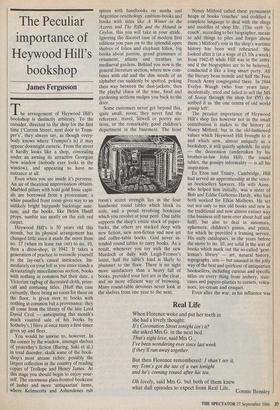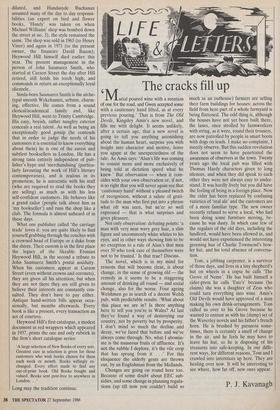The Peculiar importance of Heywood Hill's bookshop
James Fergusson
The arrangement of Heywood Hill's bookshop is distinctly arbitrary. To the outsider, directed to the shop for the first time (`Curzon Street, next door to Trum- per's', they always say, as though every- body knows where Trumper's is) it may appear downright esoteric. From the street it hardly looks like a shop, concealing under an awning its attractive Georgian bow window (nobody ever looks in the window), and appearing to have no entrance at all.
Even when you are inside it's perverse. An air of theatrical improvisation obtains. Marbled pillars with bold gold Ionic capit- als are borrowed from a proscenium; a white panelled front room gives way to an unlikely bright burgundy backstage sanc- tum; and the books, like Helen Hanff props, tumble too neatly on the rich red carpet.
Heywood Hill's is 50 years old this month, but its physical arrangement has changed little since it made the move from no, 17 (when its lease ran out) to no. 10, then a dress-shop, in 1942. It takes a generation of practice to reconcile yourself to the lay-out's casual intricacies. Im- mediately on your left as you enter stands a devastatingly miscellaneous section, books with nothing in common but their date, a Victorian ragbag of decorated cloth, prize- calf and confusing titles. (Half this case currently, there being no room for them on the floor, is given over to books with nothing in common but a provenance: they all come from the library of the late Lord David Cecil — anticipating this month's much vaunted sale of his books by Sotheby's.) Here at once many a first-timer gives up and flees.
You would be unwise to, however. In the corner by the window, amongst shelves of yesterday's fiction (Baring, Saki et al.) in total disorder, skulk some of the book- shop's most arcane riches: possibly the largest collection in the country of reading copies of Trollope and Henry James. At this stage you should begin to enjoy your- self. The enormous glass-fronted bookcase of lusher and more 'antiquarian' items, where Kelmscotts and Ashendenes rub spines with handbooks on moths and Argentine ornithology, emblem-books and books with titles like A Winter in the Azores and The Rifle and the Hound in Ceylon, this you will take in your stride. Ignoring the discreet case of modern first editions you pass on to the splendid open shelves of folios and elephant folios, big books about parrots, grand grammars of ornament, atlases and treatises on mediaeval gardens. Behind you now is the general literature section, where new com- bines with old and the dim weeds of an alphabet can suddenly be spotted, poking their way between the dust-jackets; then the playful chaos of the wine, food and gardening sections nudges you back to the door.
Some customers never get beyond this, quite small, room; they never find the reference, travel, Sitwell or poetry sec- tions, or the remarkably good children's department in the basement. The front room's secret strength lies in the four handsome round tables which block its aisle, and a proud revolving bookcase which you revolve at your peril. One table supports the shop's entire stock of paper- backs, the others are stacked deep with new fiction, new non-fiction and new art and coffee-table books. God never in- tended round tables to carry books. As a result, whenever you toy with the new Murdoch or daily with Leigh-Fermor's latest, half the table's load is likely to plummet to the floor. There is no sight more satisfactory than a heavy fall of books, provided your feet are in the clear, and no more efficient way of browsing. Many round-table devotees never look at the shelves from one year to the next. Nancy Mitford called these permanent heaps of books 'couches' and codified a complete language to deal with the slings and muddles of shop life. (The verb 'to couch', according to her biographer, meant to add things to piles and forget about them.) Mitford's role in the shop's wartime history has been well rehearsed. She looked after it (at a wage of £3.10s a week) from 1942-45 while Hill was in the army, and if the biographies are to be believed, conducted it like a long smart party. All the literary beau monde and half the Free French Army congregated there. In 1944 Evelyn .Waugh (who four years later, incidentally, tried and failed to sell the MS of Scoop through the shop for £95) de- scribed it as 'the one centre of old world gossip left'.
The peculiar importance of Heywood Hill's shop lies however not in the small contribution it makes to the history of Nancy Mitford, but in the old-fashioned values which Heywood Hill brought to it and which now, almost uniquely as a bookshop, it still quietly upholds. Its style — the decoration (undertaken by his brother-in-law John Hill), the round tables, the gossipy informality — is all his inspiration.
Ex Eton and Trinity, Cambridge, Hill had served an apprenticeship at the veter- an booksellers Sawyers. His wife Anne, who helped him initially, was a sister of Bob and Eddie Gathorne-Hardy, who had both worked for Elkin Mathews. He set out not only to mix old books and new in the traditional and now almost extinct way (the business still turns over about half and half), but also to deal in automata, ephemera, children's games, and prints, for which he provided a framing service. His early catalogues, in the years before the move to no. 10, are solid in the sort of books which mark out the so-called 'gent- leman's library' — art, natural history, topography, sets — but unusual in the jolly way of the best and quirkiest of antiquarian booksellers, including curious and specific titles on every thing from archery, stair- cases and papyro-plastics to corsets, volca- noes, ice-cream and croquet.
Even after the war, as his influence was diluted, and Handasyde Buchanan assumed many of the day to day responsi- bilities (an expert on bird and flower books, 'Handy' was taken on when Michael Williams' shop was bombed down the street at no. 3), the style remained the same. The shop was sold in 1965 (to Henry Viner) and again in 1971 (to the present owner, the financier David Bacon); Heywood Hill himself died earlier this year. The present management in the person of John Saumarez Smith, who started at Curzon Street the day after Hill retired, still holds his torch high; and commands in return an exceptionally loyal clientele.
Simla-born Saumarez Smith is the arche- typal smooth Wykehamist, urbane, charm- ing, effective. He comes from a sound clerical/academical family and, like Heywood Hill, went to Trinity Cambridge. His easy, boyish, rather naughty exterior conceals a real talent. As well as being an exceptionally good gossip (he contends that in order to judge the needs of his customers it is essential to know everything about them) he is one of the surest and subtlest booksellers in London. He has a strong taste entirely independent of pub- lisher's hype and 'merchandising' (particu- larly favouring the work of Hill's literary contemporaries), and is zealous in its promotion; he is autocratic with his staff (who are required to read the books they are selling) as much as with his less self-confident customers. He behaves like a grand ,tailor (people talk about him as `my bookseller') and runs the shop like a club. The formula is almost unheard of in these days.
What one publisher called 'the carriage trade' loves it: you are quite likely to find yourself grubbing through the couches with a crowned head of Europe or a duke from the shires. Their custom is in the first place the legacy of the likeable Etonian Heywood Hill, in the second a tribute to John Saumarez. Smith's postal assiduity. When his customers appear at Curzon Street (even without crowns and coronets), they are given all his attention; but when they are not there they are still given to believe their interests are constantly con- sulted. They don't have to pay either. Antique hand-written bills appear occa- sionally, but months afterwards. Every book is like a present, every transaction an act of courtesy.
Heywood Hill's first catalogue, a modest document in red wrappers which appeared in 1937, prints the one and only rubrick in the firm's short catalogue series: `A large selection of New Books of every sort. Greatest care in selection is given for those customers who wish books chosen for them each week or month. Books willingly ex- changed. Every effort made to find any out-of-print book. Old Books bought and valued. Books sent post-free to anywhere in London....'
Long may the tradition continue.



























































 Previous page
Previous page